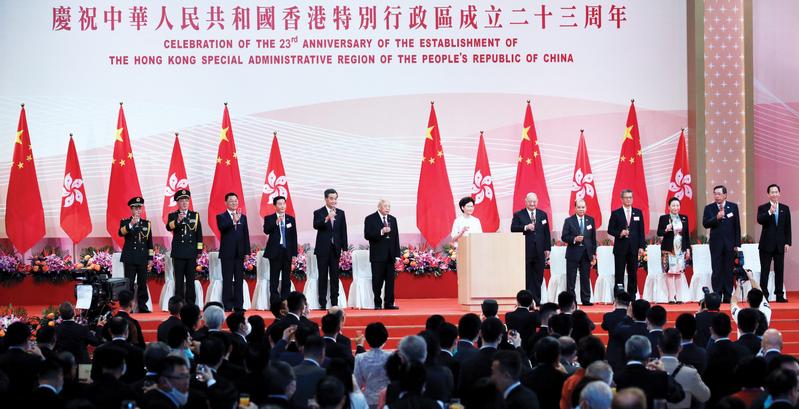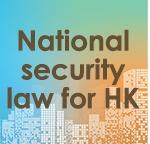‘One country, two systems’ well protected as key to city’s stability and prosperity
 Hong Kong Chief Executive Carrie Lam Cheng Yuet-ngor (center) and other participants attend a reception marking the 23rd anniversary of the establishment of the Hong Kong Special Administrative Region on July 1. (RAY F / FOR CHINA DAILY)
Hong Kong Chief Executive Carrie Lam Cheng Yuet-ngor (center) and other participants attend a reception marking the 23rd anniversary of the establishment of the Hong Kong Special Administrative Region on July 1. (RAY F / FOR CHINA DAILY)
Fifty-three countries issued a joint statement in Geneva welcoming China’s adoption of a national security law for its Hong Kong Special Administrative Region.
The law was passed unanimously on June 30 by the National People’s Congress, China’s top legislature.
“Non-interference in internal affairs of sovereign states is an essential principle enshrined in the Charter of the United Nations and a basic norm of international relations,” said Cuba’s representative, on behalf of the 53 countries, in reading the joint statement at the 44th session of the United Nations Human Rights Council on June 30.
The joint statement said that in any country, the legislative power on national security issues rests with the state, which in essence is not a human rights issue and therefore not subject to discussion at the Human Rights Council.
“We believe that every country has the right to safeguard its national security through legislation, and commend relevant steps taken for this purpose,” the statement said.
The statement on behalf of the 53 countries said the new legislation will provide a better guarantee for “one country, two systems”, benefit Hong Kong’s long-term prosperity and stability and ensure the exercising of the legal rights and freedom by Hong Kong people in a safer environment.
“We reiterate that HKSAR is an inalienable part of China. Hong Kong affairs are China’s internal affairs that allow no foreign interference. We urge relevant parties to stop using Hong Kong-related issues to interfere in China’s internal affairs.”
However, the United Kingdom, Australia and 25 other countries also issued a statement expressing “deep and growing concerns” over China’s law for its HKSAR.
A small number of external forces are interfering in another country’s internal affairs in the name of human rights for an ulterior purpose, Foreign Ministry spokesman Zhao Lijian said on July 1 in Beijing.
He noted that the national security legislation for Hong Kong is not at all an issue of human rights and should be by no means politicized.
Also in Beijing, Zhang Xiaoming, deputy director of the Hong Kong and Macao Affairs Office of the State Council, said at a news conference on July 1 that the new law serves as a guardian for Hong Kong’s prosperity and stability.
“Hong Kong’s unique status as an international financial, trade and shipping center is owing to the backing and support of the Chinese mainland, and in turn it has leveraged its strengths to support the mainland’s reform and modernization,” Zhang said.
It is also the second major law specifically tailored for Hong Kong by the central government, following the Basic Law, Zhang added.
“Or we can say it is a law that perfectly adheres to the principle of ‘one country’ and respects the differences between ‘two systems’,” he said. The legislative purpose is to maintain this principle, and the content does not overrun its framework, he added.
“Ultimately it is to uphold and improve ‘one country, two systems’, not alter it,” he said.
Zhang said some international voices have misunderstood the concept of China’s “one country, two systems” and have criticized China for eroding Hong Kong’s autonomy whenever the central authorities exercise their powers according to law.
“‘One country, two systems’ is our State policy. No one cherishes it more than we do, no one understands its true meaning better than we do and no one has more power to define and explain our policy than we do,” he added.
Zhang said the law sets out a number of stipulations to reflect Hong Kong’s legal system is different from that of the mainland.
In Hong Kong, both the chief executive and the head of the central government’s liaison office in the SAR said on July 1 that the National Security Law for Hong Kong is a historic step forward in the practice of the “one country, two systems” principle.
Addressing a reception commemorating the 23rd anniversary of the special administrative region’s establishment, Chief Executive Carrie Lam Cheng Yuet-ngor said the law marks the most significant progress in the relationship between the central government and the SAR in the past 23 years.
“The enactment of the National Security Law in Hong Kong is a turning point to take Hong Kong out of the current impasse and to restore stability and order from the chaos,” said Lam.
Speaking at the same event, Luo Huining, director of the Liaison Office of the Central People’s Government in the Hong Kong SAR, said the enactment of the National Security Law is a significant turning point for Hong Kong to move from turmoil to stability and a milestone for the practice of “one country, two systems”.
“For the tiny minority who endanger national security, this law will be a sword hanging over their heads. For the vast majority of Hong Kong residents, including foreigners in Hong Kong, the law will be a guardian that protects their rights, freedoms and peaceful life,” Luo said.
As of 8 pm on July 1, police had arrested nine people suspected of violating the National Security Law. The first two arrested who were suspected of breaking the new law, a man and a woman, were found carrying a flag and a placard, respectively, advocating “Hong Kong independence” amid an illegal assembly on Hong Kong Island in the afternoon on July 1.
Xinhua contributed to the story.



